Leadership: Self-Assessment of Values and Weaknesses Report
VerifiedAdded on 2021/06/17
|7
|1374
|37
Report
AI Summary
This report delves into the student's evolving understanding of leadership, emphasizing the importance of self-awareness and authentic leadership. The student identifies hard work and honesty as instrumental values, highlighting their significance in leadership effectiveness. The report explores how hard work contributes to discipline, confidence, and the ability to persevere, while honesty fosters trust and inspires followers. A key weakness identified is excessive emotionality, which is addressed using the Graham Gibbs reflective cycle. The student uses the cycle's five stages (Description, Feelings, Evaluation, Conclusion, and Action) to analyze emotional behavior's impact and develop strategies for managing emotions, aiming to improve leadership skills and create a more productive work environment. References to relevant leadership studies are included to support the analysis.
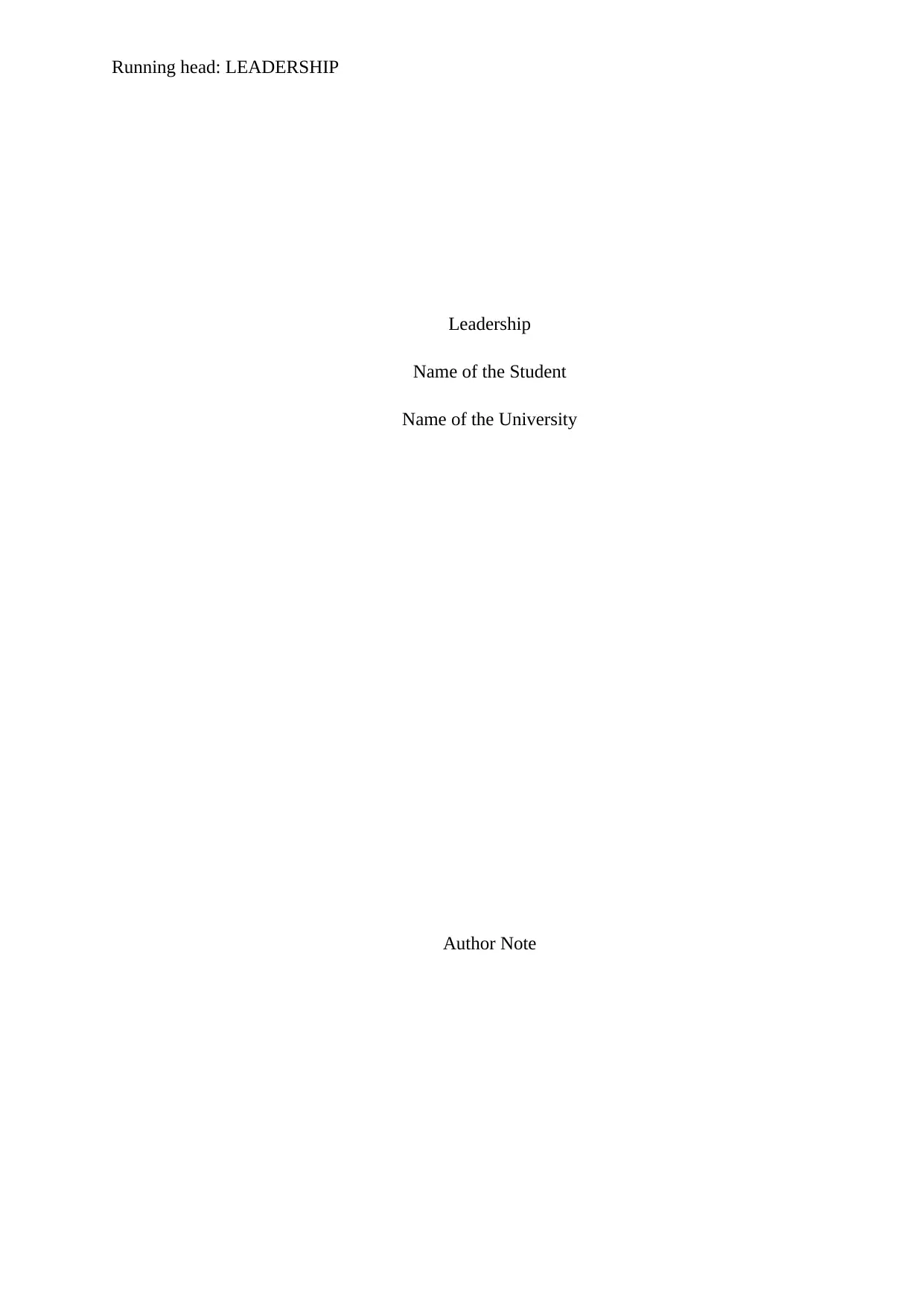
Running head: LEADERSHIP
Leadership
Name of the Student
Name of the University
Author Note
Leadership
Name of the Student
Name of the University
Author Note
Paraphrase This Document
Need a fresh take? Get an instant paraphrase of this document with our AI Paraphraser
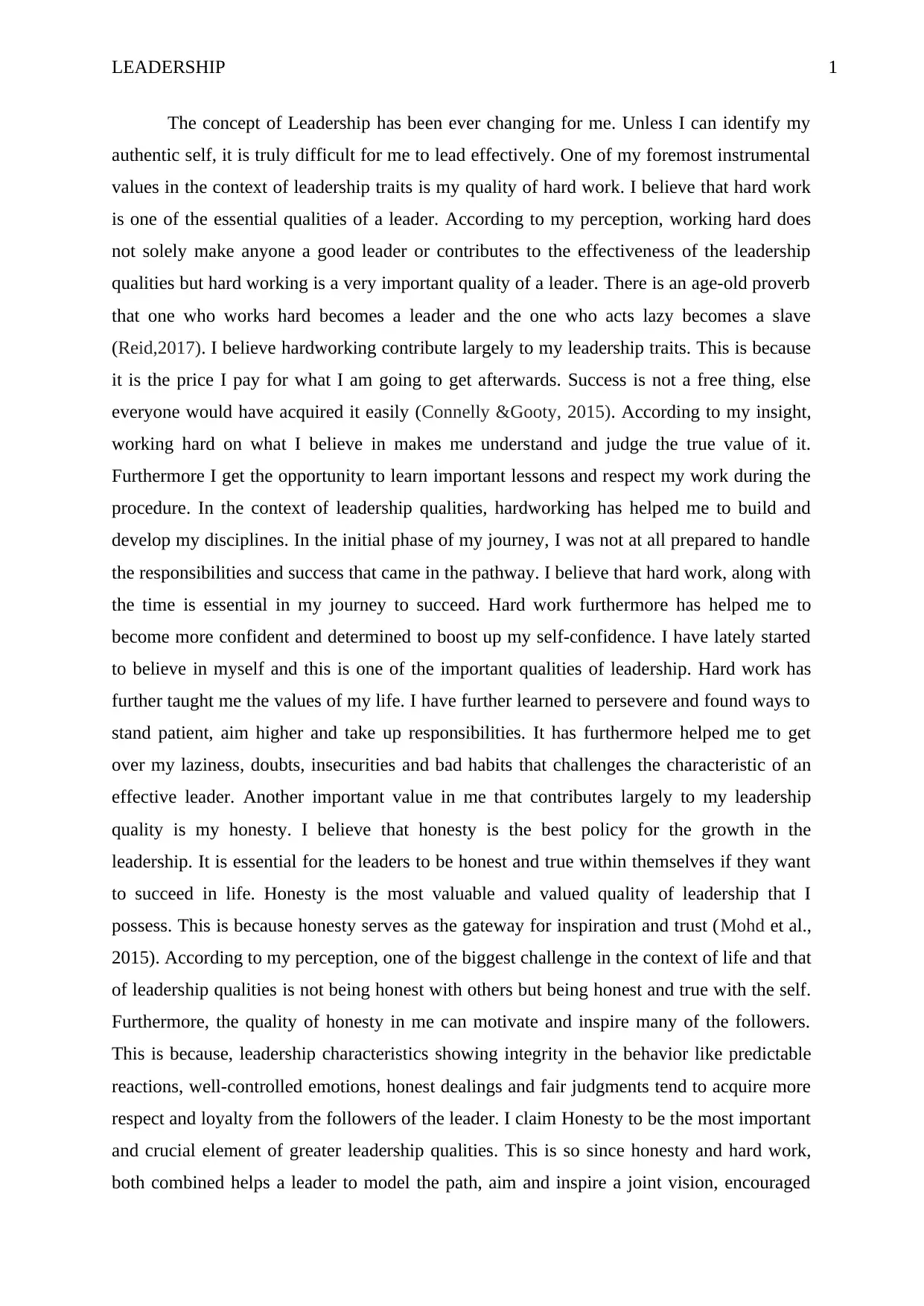
LEADERSHIP 1
The concept of Leadership has been ever changing for me. Unless I can identify my
authentic self, it is truly difficult for me to lead effectively. One of my foremost instrumental
values in the context of leadership traits is my quality of hard work. I believe that hard work
is one of the essential qualities of a leader. According to my perception, working hard does
not solely make anyone a good leader or contributes to the effectiveness of the leadership
qualities but hard working is a very important quality of a leader. There is an age-old proverb
that one who works hard becomes a leader and the one who acts lazy becomes a slave
(Reid,2017). I believe hardworking contribute largely to my leadership traits. This is because
it is the price I pay for what I am going to get afterwards. Success is not a free thing, else
everyone would have acquired it easily (Connelly &Gooty, 2015). According to my insight,
working hard on what I believe in makes me understand and judge the true value of it.
Furthermore I get the opportunity to learn important lessons and respect my work during the
procedure. In the context of leadership qualities, hardworking has helped me to build and
develop my disciplines. In the initial phase of my journey, I was not at all prepared to handle
the responsibilities and success that came in the pathway. I believe that hard work, along with
the time is essential in my journey to succeed. Hard work furthermore has helped me to
become more confident and determined to boost up my self-confidence. I have lately started
to believe in myself and this is one of the important qualities of leadership. Hard work has
further taught me the values of my life. I have further learned to persevere and found ways to
stand patient, aim higher and take up responsibilities. It has furthermore helped me to get
over my laziness, doubts, insecurities and bad habits that challenges the characteristic of an
effective leader. Another important value in me that contributes largely to my leadership
quality is my honesty. I believe that honesty is the best policy for the growth in the
leadership. It is essential for the leaders to be honest and true within themselves if they want
to succeed in life. Honesty is the most valuable and valued quality of leadership that I
possess. This is because honesty serves as the gateway for inspiration and trust (Mohd et al.,
2015). According to my perception, one of the biggest challenge in the context of life and that
of leadership qualities is not being honest with others but being honest and true with the self.
Furthermore, the quality of honesty in me can motivate and inspire many of the followers.
This is because, leadership characteristics showing integrity in the behavior like predictable
reactions, well-controlled emotions, honest dealings and fair judgments tend to acquire more
respect and loyalty from the followers of the leader. I claim Honesty to be the most important
and crucial element of greater leadership qualities. This is so since honesty and hard work,
both combined helps a leader to model the path, aim and inspire a joint vision, encouraged
The concept of Leadership has been ever changing for me. Unless I can identify my
authentic self, it is truly difficult for me to lead effectively. One of my foremost instrumental
values in the context of leadership traits is my quality of hard work. I believe that hard work
is one of the essential qualities of a leader. According to my perception, working hard does
not solely make anyone a good leader or contributes to the effectiveness of the leadership
qualities but hard working is a very important quality of a leader. There is an age-old proverb
that one who works hard becomes a leader and the one who acts lazy becomes a slave
(Reid,2017). I believe hardworking contribute largely to my leadership traits. This is because
it is the price I pay for what I am going to get afterwards. Success is not a free thing, else
everyone would have acquired it easily (Connelly &Gooty, 2015). According to my insight,
working hard on what I believe in makes me understand and judge the true value of it.
Furthermore I get the opportunity to learn important lessons and respect my work during the
procedure. In the context of leadership qualities, hardworking has helped me to build and
develop my disciplines. In the initial phase of my journey, I was not at all prepared to handle
the responsibilities and success that came in the pathway. I believe that hard work, along with
the time is essential in my journey to succeed. Hard work furthermore has helped me to
become more confident and determined to boost up my self-confidence. I have lately started
to believe in myself and this is one of the important qualities of leadership. Hard work has
further taught me the values of my life. I have further learned to persevere and found ways to
stand patient, aim higher and take up responsibilities. It has furthermore helped me to get
over my laziness, doubts, insecurities and bad habits that challenges the characteristic of an
effective leader. Another important value in me that contributes largely to my leadership
quality is my honesty. I believe that honesty is the best policy for the growth in the
leadership. It is essential for the leaders to be honest and true within themselves if they want
to succeed in life. Honesty is the most valuable and valued quality of leadership that I
possess. This is because honesty serves as the gateway for inspiration and trust (Mohd et al.,
2015). According to my perception, one of the biggest challenge in the context of life and that
of leadership qualities is not being honest with others but being honest and true with the self.
Furthermore, the quality of honesty in me can motivate and inspire many of the followers.
This is because, leadership characteristics showing integrity in the behavior like predictable
reactions, well-controlled emotions, honest dealings and fair judgments tend to acquire more
respect and loyalty from the followers of the leader. I claim Honesty to be the most important
and crucial element of greater leadership qualities. This is so since honesty and hard work,
both combined helps a leader to model the path, aim and inspire a joint vision, encouraged
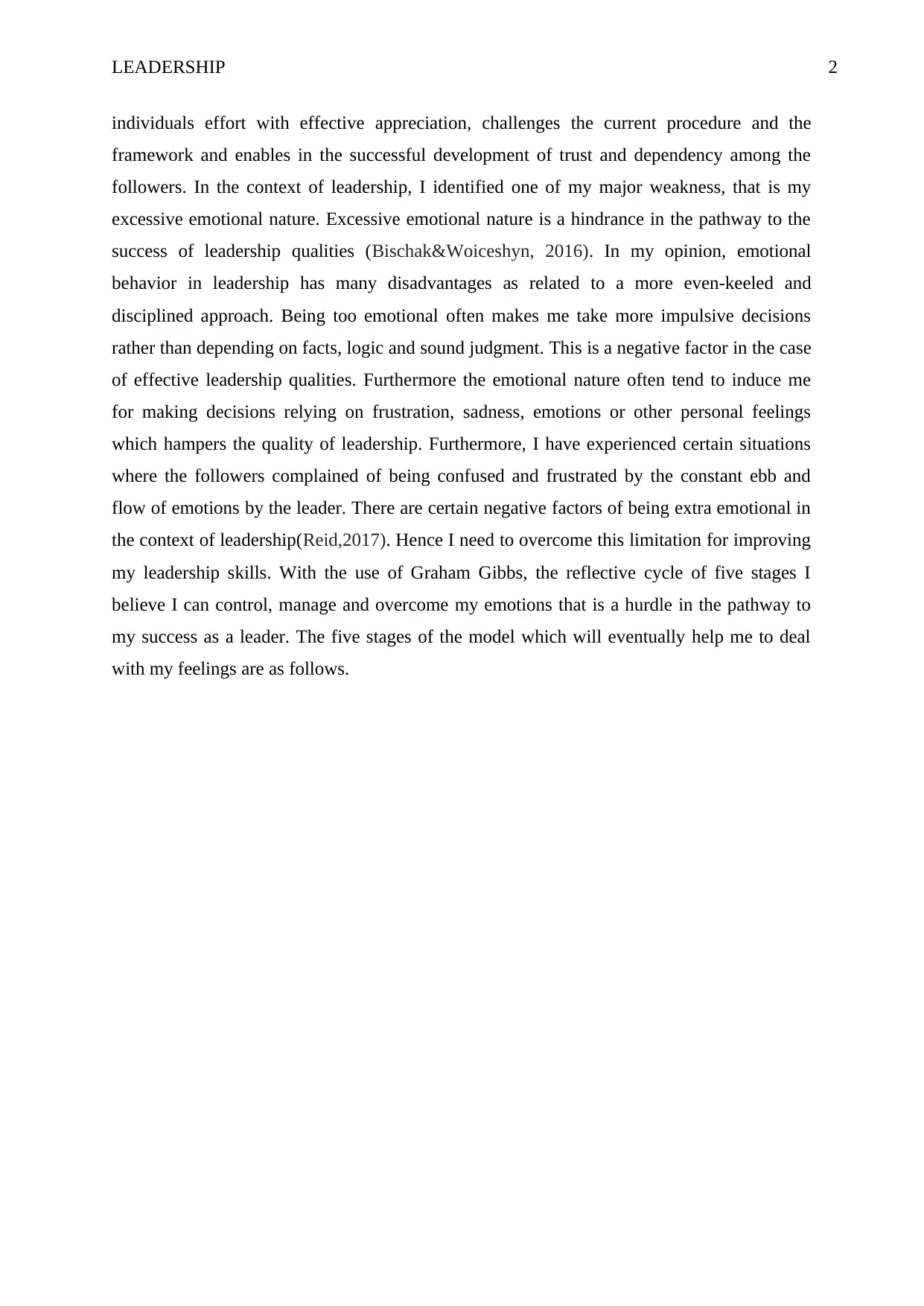
LEADERSHIP 2
individuals effort with effective appreciation, challenges the current procedure and the
framework and enables in the successful development of trust and dependency among the
followers. In the context of leadership, I identified one of my major weakness, that is my
excessive emotional nature. Excessive emotional nature is a hindrance in the pathway to the
success of leadership qualities (Bischak&Woiceshyn, 2016). In my opinion, emotional
behavior in leadership has many disadvantages as related to a more even-keeled and
disciplined approach. Being too emotional often makes me take more impulsive decisions
rather than depending on facts, logic and sound judgment. This is a negative factor in the case
of effective leadership qualities. Furthermore the emotional nature often tend to induce me
for making decisions relying on frustration, sadness, emotions or other personal feelings
which hampers the quality of leadership. Furthermore, I have experienced certain situations
where the followers complained of being confused and frustrated by the constant ebb and
flow of emotions by the leader. There are certain negative factors of being extra emotional in
the context of leadership(Reid,2017). Hence I need to overcome this limitation for improving
my leadership skills. With the use of Graham Gibbs, the reflective cycle of five stages I
believe I can control, manage and overcome my emotions that is a hurdle in the pathway to
my success as a leader. The five stages of the model which will eventually help me to deal
with my feelings are as follows.
individuals effort with effective appreciation, challenges the current procedure and the
framework and enables in the successful development of trust and dependency among the
followers. In the context of leadership, I identified one of my major weakness, that is my
excessive emotional nature. Excessive emotional nature is a hindrance in the pathway to the
success of leadership qualities (Bischak&Woiceshyn, 2016). In my opinion, emotional
behavior in leadership has many disadvantages as related to a more even-keeled and
disciplined approach. Being too emotional often makes me take more impulsive decisions
rather than depending on facts, logic and sound judgment. This is a negative factor in the case
of effective leadership qualities. Furthermore the emotional nature often tend to induce me
for making decisions relying on frustration, sadness, emotions or other personal feelings
which hampers the quality of leadership. Furthermore, I have experienced certain situations
where the followers complained of being confused and frustrated by the constant ebb and
flow of emotions by the leader. There are certain negative factors of being extra emotional in
the context of leadership(Reid,2017). Hence I need to overcome this limitation for improving
my leadership skills. With the use of Graham Gibbs, the reflective cycle of five stages I
believe I can control, manage and overcome my emotions that is a hurdle in the pathway to
my success as a leader. The five stages of the model which will eventually help me to deal
with my feelings are as follows.
⊘ This is a preview!⊘
Do you want full access?
Subscribe today to unlock all pages.

Trusted by 1+ million students worldwide
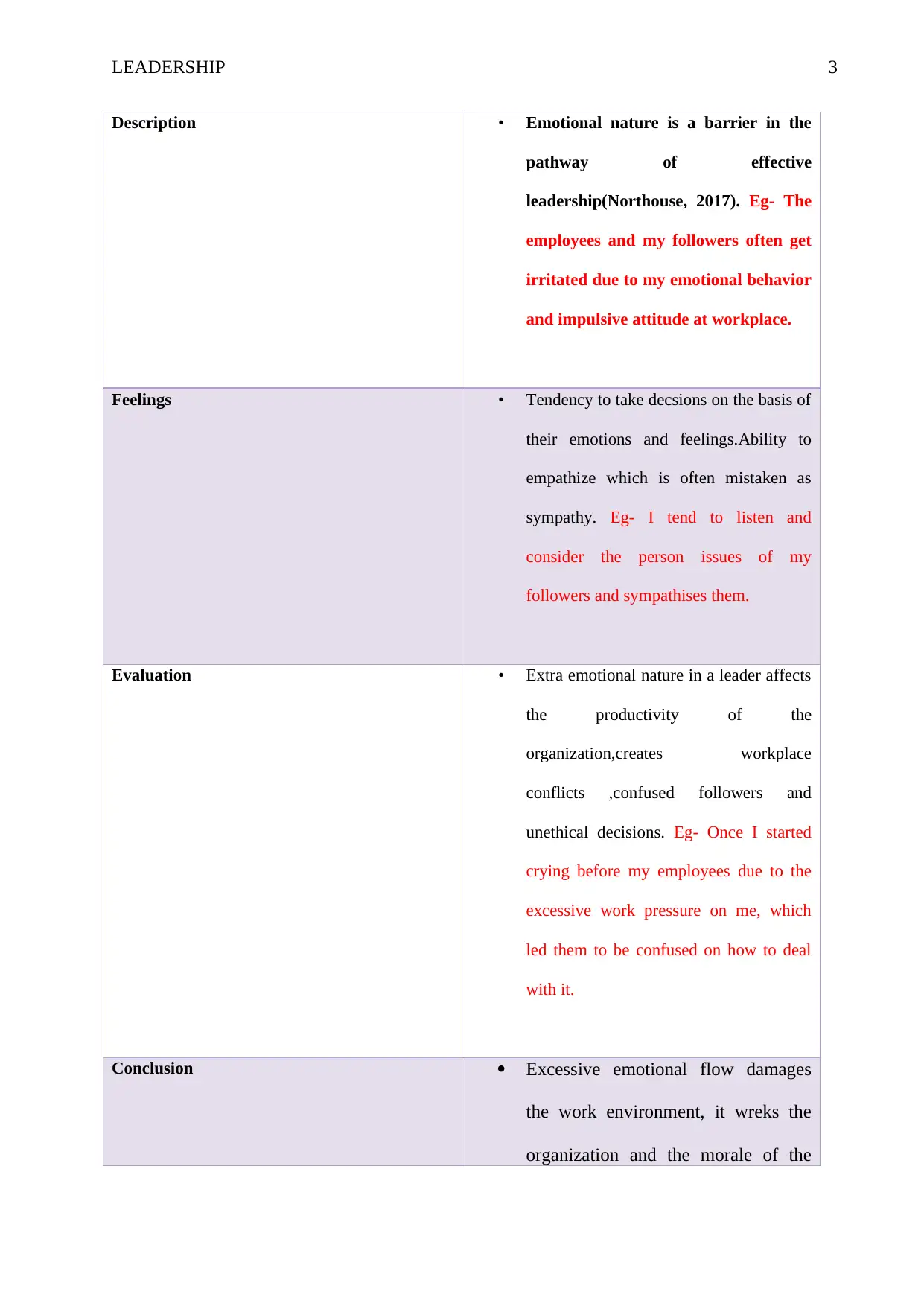
LEADERSHIP 3
Description • Emotional nature is a barrier in the
pathway of effective
leadership(Northouse, 2017). Eg- The
employees and my followers often get
irritated due to my emotional behavior
and impulsive attitude at workplace.
Feelings • Tendency to take decsions on the basis of
their emotions and feelings.Ability to
empathize which is often mistaken as
sympathy. Eg- I tend to listen and
consider the person issues of my
followers and sympathises them.
Evaluation • Extra emotional nature in a leader affects
the productivity of the
organization,creates workplace
conflicts ,confused followers and
unethical decisions. Eg- Once I started
crying before my employees due to the
excessive work pressure on me, which
led them to be confused on how to deal
with it.
Conclusion Excessive emotional flow damages
the work environment, it wreks the
organization and the morale of the
Description • Emotional nature is a barrier in the
pathway of effective
leadership(Northouse, 2017). Eg- The
employees and my followers often get
irritated due to my emotional behavior
and impulsive attitude at workplace.
Feelings • Tendency to take decsions on the basis of
their emotions and feelings.Ability to
empathize which is often mistaken as
sympathy. Eg- I tend to listen and
consider the person issues of my
followers and sympathises them.
Evaluation • Extra emotional nature in a leader affects
the productivity of the
organization,creates workplace
conflicts ,confused followers and
unethical decisions. Eg- Once I started
crying before my employees due to the
excessive work pressure on me, which
led them to be confused on how to deal
with it.
Conclusion Excessive emotional flow damages
the work environment, it wreks the
organization and the morale of the
Paraphrase This Document
Need a fresh take? Get an instant paraphrase of this document with our AI Paraphraser
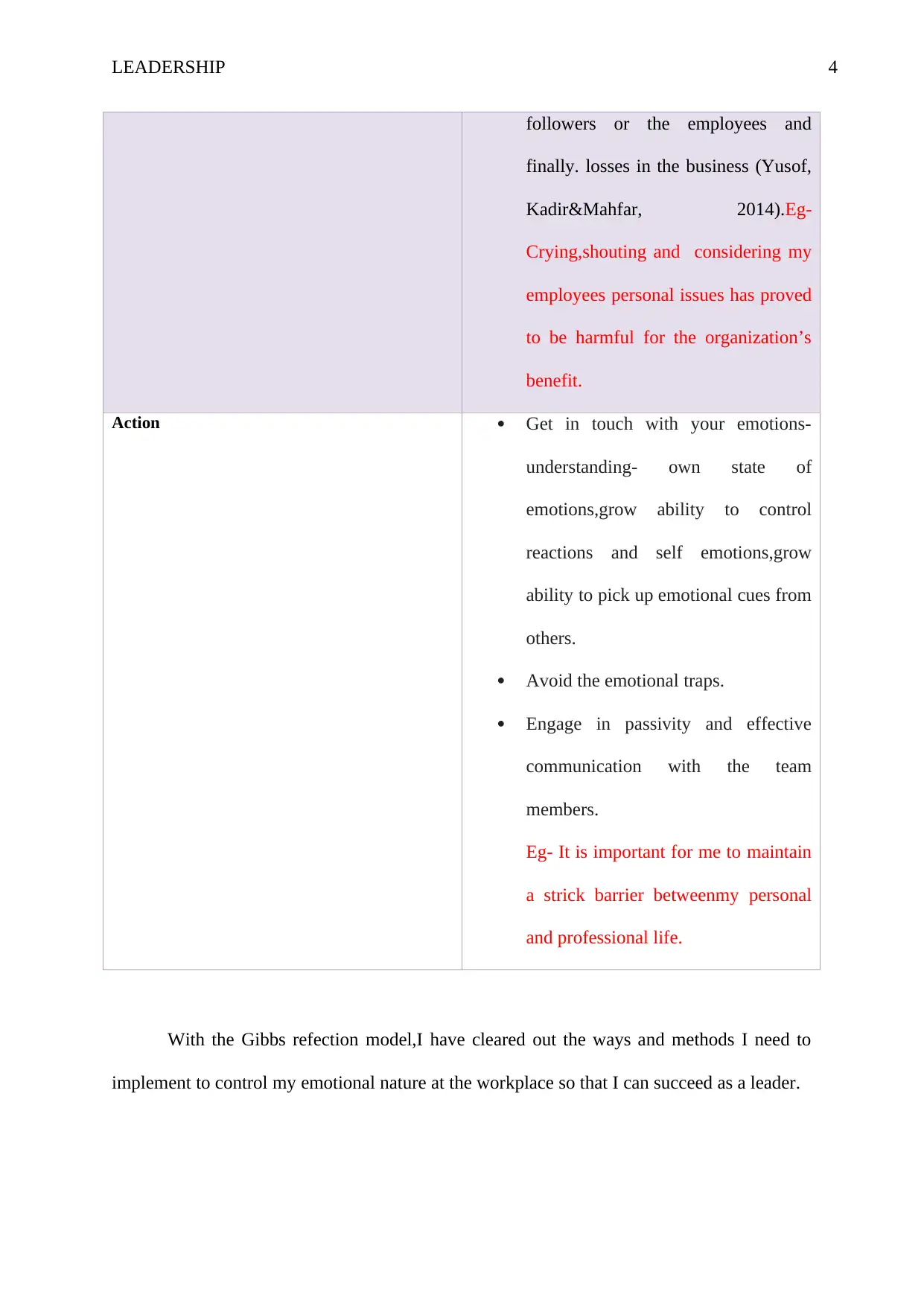
LEADERSHIP 4
followers or the employees and
finally. losses in the business (Yusof,
Kadir&Mahfar, 2014).Eg-
Crying,shouting and considering my
employees personal issues has proved
to be harmful for the organization’s
benefit.
Action Get in touch with your emotions-
understanding- own state of
emotions,grow ability to control
reactions and self emotions,grow
ability to pick up emotional cues from
others.
Avoid the emotional traps.
Engage in passivity and effective
communication with the team
members.
Eg- It is important for me to maintain
a strick barrier betweenmy personal
and professional life.
With the Gibbs refection model,I have cleared out the ways and methods I need to
implement to control my emotional nature at the workplace so that I can succeed as a leader.
followers or the employees and
finally. losses in the business (Yusof,
Kadir&Mahfar, 2014).Eg-
Crying,shouting and considering my
employees personal issues has proved
to be harmful for the organization’s
benefit.
Action Get in touch with your emotions-
understanding- own state of
emotions,grow ability to control
reactions and self emotions,grow
ability to pick up emotional cues from
others.
Avoid the emotional traps.
Engage in passivity and effective
communication with the team
members.
Eg- It is important for me to maintain
a strick barrier betweenmy personal
and professional life.
With the Gibbs refection model,I have cleared out the ways and methods I need to
implement to control my emotional nature at the workplace so that I can succeed as a leader.
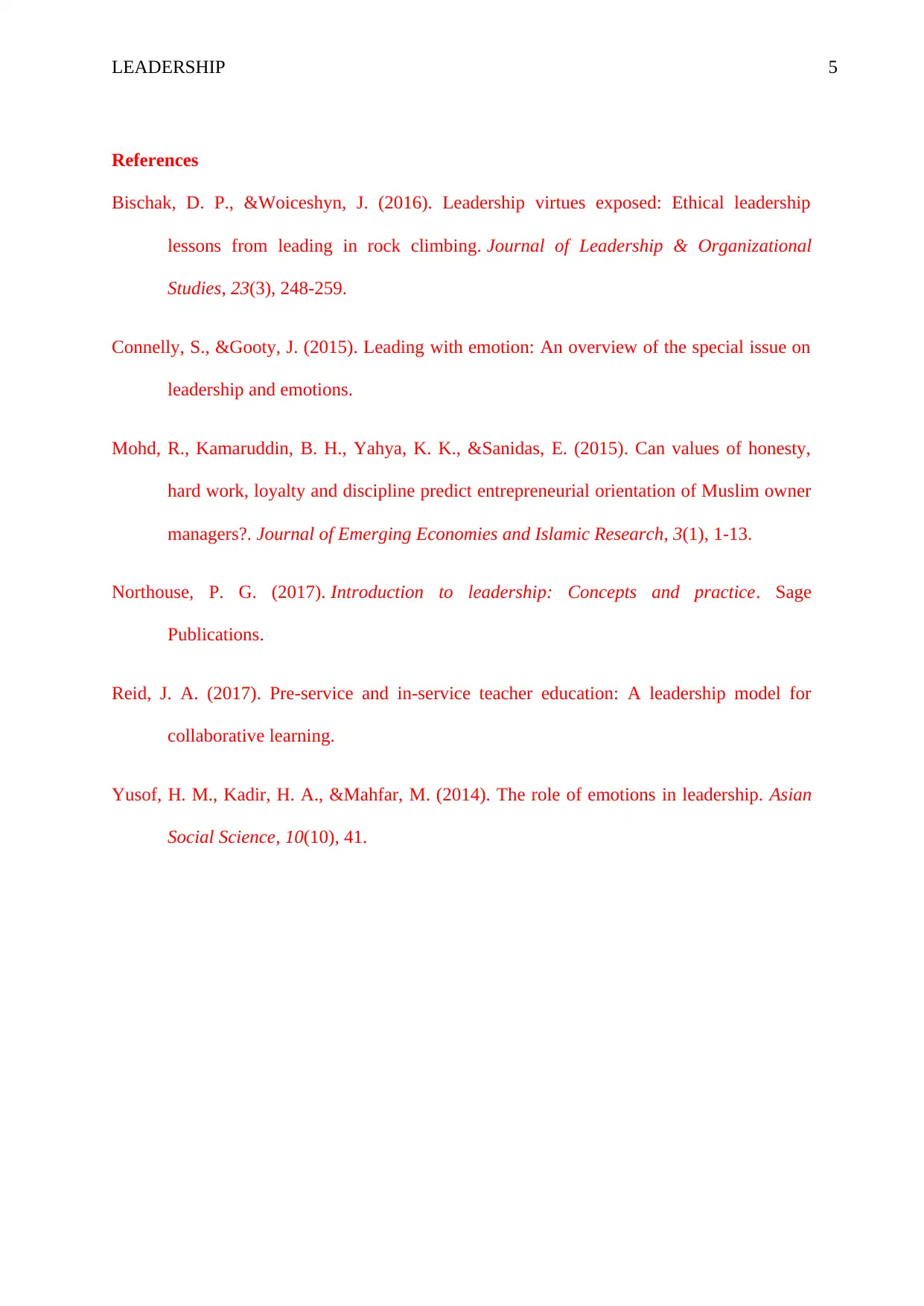
LEADERSHIP 5
References
Bischak, D. P., &Woiceshyn, J. (2016). Leadership virtues exposed: Ethical leadership
lessons from leading in rock climbing. Journal of Leadership & Organizational
Studies, 23(3), 248-259.
Connelly, S., &Gooty, J. (2015). Leading with emotion: An overview of the special issue on
leadership and emotions.
Mohd, R., Kamaruddin, B. H., Yahya, K. K., &Sanidas, E. (2015). Can values of honesty,
hard work, loyalty and discipline predict entrepreneurial orientation of Muslim owner
managers?. Journal of Emerging Economies and Islamic Research, 3(1), 1-13.
Northouse, P. G. (2017). Introduction to leadership: Concepts and practice. Sage
Publications.
Reid, J. A. (2017). Pre-service and in-service teacher education: A leadership model for
collaborative learning.
Yusof, H. M., Kadir, H. A., &Mahfar, M. (2014). The role of emotions in leadership. Asian
Social Science, 10(10), 41.
References
Bischak, D. P., &Woiceshyn, J. (2016). Leadership virtues exposed: Ethical leadership
lessons from leading in rock climbing. Journal of Leadership & Organizational
Studies, 23(3), 248-259.
Connelly, S., &Gooty, J. (2015). Leading with emotion: An overview of the special issue on
leadership and emotions.
Mohd, R., Kamaruddin, B. H., Yahya, K. K., &Sanidas, E. (2015). Can values of honesty,
hard work, loyalty and discipline predict entrepreneurial orientation of Muslim owner
managers?. Journal of Emerging Economies and Islamic Research, 3(1), 1-13.
Northouse, P. G. (2017). Introduction to leadership: Concepts and practice. Sage
Publications.
Reid, J. A. (2017). Pre-service and in-service teacher education: A leadership model for
collaborative learning.
Yusof, H. M., Kadir, H. A., &Mahfar, M. (2014). The role of emotions in leadership. Asian
Social Science, 10(10), 41.
⊘ This is a preview!⊘
Do you want full access?
Subscribe today to unlock all pages.

Trusted by 1+ million students worldwide

LEADERSHIP 6
1 out of 7
Related Documents
Your All-in-One AI-Powered Toolkit for Academic Success.
+13062052269
info@desklib.com
Available 24*7 on WhatsApp / Email
![[object Object]](/_next/static/media/star-bottom.7253800d.svg)
Unlock your academic potential
Copyright © 2020–2026 A2Z Services. All Rights Reserved. Developed and managed by ZUCOL.





